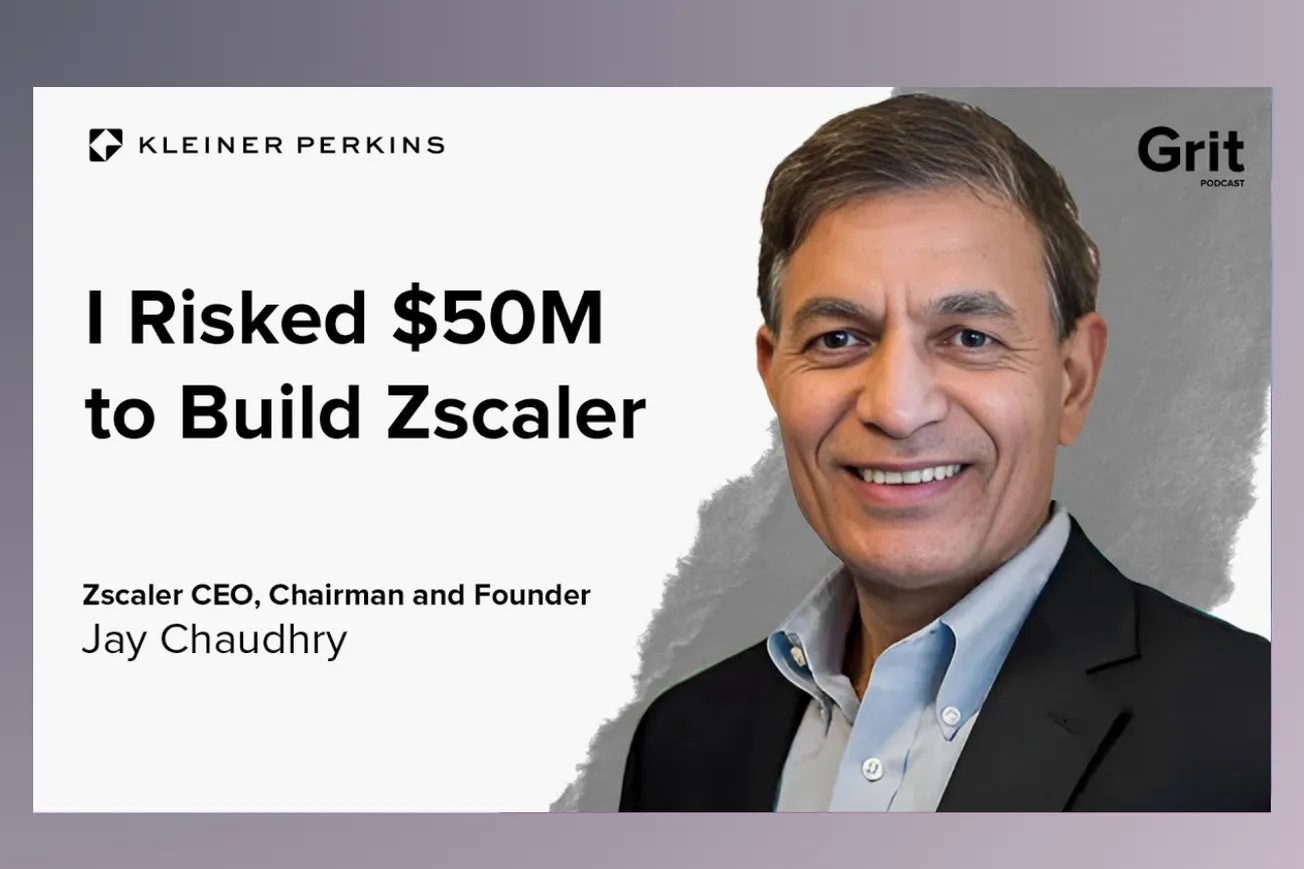Table of Contents
Born in a Himalayan village without electricity, Jay Chaudhry built Zscaler into a $32B cloud security giant securing 48% of Fortune 500 companies through relentless passion and unconventional leadership.
How does someone go from a village without electricity to building one of the world's most valuable cybersecurity companies? Jay Chaudhry's journey from rural India to Silicon Valley reveals the unconventional principles behind Zscaler's remarkable success.
Key Takeaways
- Jay Chaudhry owns 40% of Zscaler after investing $50M of his own money and refusing external funding until late stages
- Zscaler secures 48% of Fortune 500 companies, making it a mission-critical application for global business operations
- The company started with 10 engineers split between Bangalore and Silicon Valley, opening India operations before the US headquarters
- Chaudhry conducts 3-5 interviews every weekend, focusing on passion and drive over pure technical skills in hiring decisions
- He still flies economy on short flights and uses business class only for efficiency on longer international routes
- The company processes 500 billion transaction logs daily, creating massive proprietary datasets for AI model training
- Chaudhry views entrepreneurship as a hobby rather than work, enabling sustained passion across five successful companies
- Zscaler's employee ownership stands at 30%, significantly higher than typical VC-backed companies due to minimal external funding
Timeline Overview
- 00:00–00:42 — Trailer: Zscaler secures 48% of Fortune 500 companies and the excitement of making a global difference
- 00:42–01:21 — Introduction: Grit podcast introduction featuring Jay Chaudhry, CEO of his fifth company and wealthiest Indian-American
- 01:21–04:26 — His Fifth Company: Building companies as passion rather than work, discussing retirement plans and nonprofit aspirations
- 04:26–10:53 — Entrepreneurs' Existential Fear: Enterprise vs consumer business stability, succession planning challenges, and avoiding founder departure failures
- 10:53–12:46 — Customer Engagement and New Innovations: Focus on innovation and customer relationships over operational excellence and mature products
- 12:46–19:34 — No Private Jets, No Business Class: Travel efficiency over comfort, upgrading only for multi-city international trips
- 19:34–23:38 — "I Never Used Money": Self-funding $50M investment, minimal external capital, maintaining 40% ownership through strategic choices
- 23:38–26:17 — Born and Raised in India: Opening Bangalore office before Silicon Valley, recruiting talent, and leveraging cultural understanding
- 26:17–30:35 — Hiring Legends: Leading by example, weekend interviews, creating room for exceptional talent regardless of organizational constraints
- 30:35–35:09 — Walking on Water: Identifying passionate driven people over pure intelligence, learning from interview questions candidates ask
- 35:09–39:55 — "Dolphining": Finding leaders who dive deep into details when passionate, distinguishing surface-level from genuine commitment
- 39:55–42:11 — Areas of Weakness: Two-month assessment periods, helping struggling executives, and making difficult personnel decisions
- 42:11–44:56 — Passionate Even on the Weekends: Work-life integration, not expecting others to match founder passion levels
- 44:56–47:35 — Work During Roller Coasters: Family priority management, never missing graduations, engaged parenting during company growth
- 47:35–49:21 — The Weight of the World: Mission-critical responsibility for Fortune 500 security, excitement versus pressure of global impact
- 49:21–56:20 — Leveraging AI: Customer support automation, dedicated AI teams, building proprietary models using 500 billion daily transactions
- 56:20–End — Outro: Podcast conclusion and call-to-action for continued listening
The Unconventional Wealth Builder
Jay Chaudhry represents a unique breed of Silicon Valley billionaire. Unlike many tech executives who cash out early or leverage debt against their holdings, Chaudhry has maintained his 40% ownership stake in Zscaler without selling significant shares. This approach has made him the wealthiest Indian-American entrepreneur, with holdings worth over $13 billion.
- His wealth accumulation strategy defies conventional wisdom about diversification and liquidity management in high-growth technology companies
- Despite his net worth, Chaudhry continues flying economy class on shorter domestic routes, upgrading to business class only for international travel spanning multiple cities
- He views money through an efficiency lens rather than comfort, asking "What's the ROI?" before making spending decisions beyond operational necessities
- The CEO still conducts his own travel bookings through administrative staff who prioritize schedule flexibility over premium cabin upgrades
- His frugal approach extends to rejecting private aviation despite the time savings it could provide for his extensive travel schedule
- This financial discipline reflects deeper principles about resource allocation and setting examples for company culture across global operations
Chaudhry's approach challenges the typical Silicon Valley narrative of founders who quickly diversify their wealth or adopt lavish lifestyles. His continued ownership concentration demonstrates extraordinary confidence in Zscaler's long-term prospects while maintaining the financial discipline that characterized his earlier entrepreneurial ventures.
From Rural India to Global Security Leadership
The Zscaler origin story reveals how geographic arbitrage and cultural understanding can drive technological innovation. Chaudhry's decision to establish engineering operations in Bangalore before securing Silicon Valley office space demonstrated prescient thinking about global talent distribution and cost optimization.
- Zscaler launched with 10 engineers total, with six based in India and four in the United States, inverting typical startup geography patterns
- Chaudhry spent two weeks per month in Bangalore during the first 15 months, personally recruiting talent and managing product development cycles
- His strategy leveraged India's deep technical talent pool while maintaining product management oversight and customer-facing operations in Silicon Valley markets
- The founder's Indian heritage provided cultural credibility essential for recruiting top engineering talent in competitive Bangalore technology markets
- Early international expansion required navigating complex regulatory environments while building security products for multinational enterprise customers with strict compliance requirements
- This dual-geography approach enabled rapid scaling while maintaining cost efficiency during the critical early growth phases when venture funding remained unavailable
The company's success in India operations validated Chaudhry's belief that "India has so many smart people if you can find the right one they're going to do the right thing." This philosophy guided hiring decisions across global markets as Zscaler expanded its engineering footprint beyond the initial Bangalore and Silicon Valley locations.
The Art of Passionate Leadership
Chaudhry's management philosophy centers on identifying and nurturing what he calls "people who walk on water" – individuals whose passion and drive transcend conventional skill assessments. This approach has shaped Zscaler's culture and competitive advantage in attracting top cybersecurity talent.
- Weekend interviews have become standard practice, with Chaudhry conducting 3-5 candidate sessions every Saturday and Sunday when distractions minimize
- His interview technique focuses more on questions candidates ask than answers they provide, revealing thinking patterns and genuine curiosity levels
- The company maintains an open hiring policy for exceptional talent regardless of current organizational chart constraints or budget allocations
- Chaudhry can typically assess leadership potential within two months, followed by 3-4 months of targeted development before making retention decisions
- Performance improvement efforts focus on matching individual strengths with appropriate role responsibilities rather than attempting comprehensive skill development across all areas
- The CEO personally interviews candidates without specific roles in mind, building talent pipelines while learning industry best practices from experienced professionals
This intensive personal involvement in hiring reflects Chaudhry's conviction that passionate individuals drive exponential results. He distinguishes between surface-level enthusiasm and deep commitment by examining candidates' willingness to "go into the water" – diving deep into technical details rather than remaining at strategic overview levels.
Mission-Critical Infrastructure at Scale
Zscaler's evolution from startup to essential enterprise infrastructure illustrates how cybersecurity companies achieve mission-critical status. The platform now processes 500 billion daily transactions while securing nearly half of Fortune 500 companies, creating enormous responsibility and competitive advantages.
- Enterprise customers describe Zscaler as mission-critical, meaning business operations cannot function when the platform experiences downtime or performance issues
- The company's cloud-native architecture enables global scalability while maintaining security standards required by highly regulated industries and government agencies
- Zscaler's 48% Fortune 500 penetration rate demonstrates market validation for cloud-first security approaches over traditional perimeter-based solutions
- Daily transaction volume of 500 billion creates proprietary datasets essential for training AI models and detecting emerging security threats across global networks
- Customer dependency levels generate recurring revenue streams while requiring constant innovation to maintain competitive positioning against emerging security vendors
- The platform's criticality means that technical decisions directly impact global business operations, elevating engineering requirements and operational excellence standards
This scale creates both opportunities and challenges. While customer dependency generates predictable revenue growth, it also demands continuous investment in reliability, performance, and security innovation to maintain trust relationships with enterprise customers whose businesses depend on Zscaler's uptime.
AI Strategy and Future Innovation
Chaudhry's approach to artificial intelligence development reflects his broader philosophy about focused execution and leveraging proprietary advantages. Rather than adopting off-the-shelf solutions exclusively, Zscaler is building specialized AI capabilities using its massive security datasets.
- The company has established a dedicated AI team reporting directly to the CEO, isolated from broader engineering organizations to maintain focus
- This specialized group consists of PhD-level scientists tasked with building foundational AI engines rather than immediate product features
- Zscaler's 500 billion daily transaction logs provide training data advantages that competitors cannot easily replicate through external partnerships or acquisitions
- Internal AI applications span customer support automation, software development assistance, and sales training, with data quality initiatives preceding broad deployment
- The strategy emphasizes building core AI infrastructure first, then enabling product teams to develop specific applications using these foundational capabilities
- Chaudhry views AI model optimization for cybersecurity as essential competitive differentiation, similar to how public cloud platforms require specialized security approaches
The AI initiative represents Chaudhry's conviction that transformative technologies require dedicated focus rather than part-time attention from existing teams. This organizational approach mirrors his hiring philosophy: passionate individuals working full-time on breakthrough innovations deliver superior results compared to distributed efforts across multiple priorities.
Work-Life Integration Philosophy
Chaudhry's perspective on entrepreneurship challenges conventional narratives about startup difficulty and personal sacrifice. Rather than viewing company building as "chewing glass and staring into the abyss," he frames it as an engaging hobby that provides energy rather than depleting it.
- His fifth company represents continued passion for problem-solving rather than obligation or financial necessity after achieving significant wealth through previous exits
- Family activities like Six Flags visits receive full attention without phone calls or business distractions, demonstrating clear boundary management
- The CEO acknowledges that not all team members share his passion levels and adjusts expectations accordingly for work-life balance across different employee groups
- Weekend work sessions occur naturally among passionate team members but aren't mandated company-wide as the organization has grown and hired from larger corporations
- Marriage alignment proves crucial for sustaining entrepreneurial careers, with both spouses sharing preferences for family time over extensive social activities
- Long-term thinking about post-Zscaler activities focuses on philanthropic ventures addressing education and healthcare needs rather than traditional retirement
This integration model suggests that sustainable entrepreneurship requires genuine passion rather than forced discipline. Chaudhry's energy increases through work engagement, enabling sustained performance across decades while maintaining family relationships and personal interests outside business operations.
Common Questions
Q: How does Jay Chaudhry maintain 40% ownership while building a $32B company? A: He self-funded with $50M personal investment and raised minimal external capital until late-stage growth, maintaining control and equity concentration.
Q: What makes Zscaler mission-critical for Fortune 500 companies? A: The cloud security platform processes 500 billion daily transactions and enables business operations that cannot function during downtime.
Q: Why does Chaudhry still fly economy despite his billionaire status? A: He prioritizes time efficiency over comfort, upgrading only for international routes spanning multiple cities within tight schedules.
Q: How does Zscaler's AI strategy differ from typical enterprise approaches? A: They're building proprietary AI engines using 500 billion daily security transactions rather than relying solely on off-the-shelf models.
Q: What hiring philosophy drives Zscaler's talent acquisition? A: Chaudhry looks for passionate individuals who "walk on water" and dive deep into technical details rather than staying at surface levels.
Entrepreneurship becomes sustainable when viewed as passionate hobby rather than obligation. Chaudhry's journey from rural India to cybersecurity leadership demonstrates how sustained passion, strategic focus, and cultural understanding can build essential global infrastructure.





